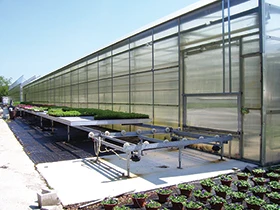
|
The need for growing space reaches a peak in late spring before the start of the shipping season. What you need is some temporary growing space for a few weeks. Here are a few ideas that may help tide you over. Cold framesEasy-to-construct cold frames made from steel tubing can provide low-cost growing space. A single layer of poly will provide temperature and rain protection. A well-drained area with swales to remove the runoff is needed. On really cold nights, a layer of blanket material will provide protection. Rolling up the plastic to the ridge will provide ventilation and access for moving plants in and out. Lean-to add-onsSeveral greenhouse manufacturers make lean-to add-on sections that are attached to the sidewalls of gutter-connected greenhouses. Both straight and curved sections are available. Some growers have fabricated their own design out of pressure-treated wood or steel tubing. The frames need to be securely attached to the greenhouse wall and the ground to prevent wind damage. The attachment of the plastic along the greenhouse sidewall needs to be sealed tight to prevent heat loss and water infiltration. Using standard plastic fastening extrusions below the greenhouse gutter usually works well. Heat for this new area can be provided from the adjacent heated greenhouse by rolling up the sidewall. During late spring, heat needs are less and the greenhouse heaters have the capacity to heat additional area. The temperature can be controlled by adjusting the height of the rolled-up plastic. Provisions for venting this add-on area are needed either with roll up sides or fans. For a few cents per square foot, you get additional growing space. Interspace hoophousesFor growers with many hoophouses, using the normal 10- to 12-foot space between the houses for late spring production makes sense. During the winter, this area needs to be kept open to store the snow that slides off the houses. But once the snow danger has passed, this could be fitted with narrow hoophouses and covered with a single layer of plastic. Some growers use this area for holding cool season crops or hardening off plants before they are shipped. Temporary heat could be added with a portable vented heater. Ventilation is frequently limited to opening the endwalls or rolling up the sidewalls.
High tunnelsHigh tunnels are low-cost hoophouses without heat or mechanical ventilation. In addition to in-ground vegetable production, they are now being used for small fruit and cut-flower production. The use for spring production of annuals, perennials and potted plants is a natural extension of this type of structure. A covering of 6 mil poly and permanent endwalls of polycarbonate provide a low-maintenance growing area. Install large doors for easy access. Cost is usually less than $3 per square foot. Wider houses are less expensive and more labor and plant efficient. Roll-out benchesRoll-out benches can provide additional growing space and an area for hardening off plants during late spring. Benches are supported on pipe rails and moved out through doors in the endwall of the greenhouse in the morning and pushed back in at night. A second layer of plants can be grown on the greenhouse floor. The system can be adapted to either hoophouses or gutter-connected ranges. Rather than building additional greenhouses that increase your taxes and operating costs, consider adding some temporary growing space to fill in for the peak growing season. The payback for this space can be less than one year.
Bartok is a regular contributor to Greenhouse Management and an agricultural engineer and emeritus extension professor at the University of Connecticut. He is an author, consultant and a certified technical service provider doing greenhouse energy audits for USDA grant programs in New England. Have a question? You can write John at jbartok@rcn.com.
|

Explore the April 2015 Issue
Check out more from this issue and find your next story to read.
Latest from Greenhouse Management
- Anthura acquires Bromelia assets from Corn. Bak in Netherlands
- Top 10 stories for National Poinsettia Day
- Langendoen Mechanical hosts open house to showcase new greenhouse build
- Conor Foy joins EHR's national sales team
- Pantone announces its 2026 Color of the Year
- Syngenta granted federal registration for Trefinti nematicide/fungicide in ornamental market
- A legacy of influence
- HILA 2025 video highlights: John Gaydos of Proven Winners








